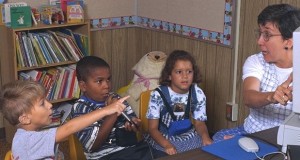How to Find a Speech Therapist
You have just learned that your child may have a speech disorder and you feel overwhelmed. There are lots of details to sort out: what type of treatment your child needs, whether your insurance will cover it, and how to find a speech therapist that can help him.
Speech therapists can be found in two main settings: public schools and private clinics. There are advantages and disadvantages to both settings.
Getting lessons from the speech therapist in your public school is usually the most inexpensive option as there is no extra charge for using the SLP’s services. A speech therapist in your child’s school can also work more closely with his teacher. Even if your child attends private school, he may be able to work with a public school speech therapist; check with your state’s education department.
However, there are a few disadvantages to consider before sending your child to a speech therapist in his school. There may be a lengthy waiting period before your child receives therapy, during which time you will likely fill out excessive amounts of paperwork. More importantly, your child may not receive the one-on-one attention that he needs. Many public school SLPs are overwhelmed by the sheer number of children they treat. Budget cuts can also mean staff shortages. Furthermore, it’s likely that your child’s therapy sessions will be short and could be irregularly scheduled, due to school holidays.
If you are unsatisfied with your school’s options or focus, you should consider a private practitioner. The advantages of using a private speech therapist are numerous. She can spend one-on-one time with your child, she can (and should) discuss your child’s progress with you regularly, and she can provide a wider range of services, such as specific therapies for problems like articulation disorders. Whenever possible, choose a speech therapist that specializes in your child’s speech disorder. Always ask to see her state license. Ideally, she should also be certified by The American Speech Hearing & Language Association (ASHA).
As well, consider the drawbacks before signing your child up for private speech therapy sessions. A private SLP is less likely to have regular communication with your child’s teachers. Some SLPs may have more experience working with adults than children. Lastly, private speech therapy is typically expensive. Always know what your insurance will cover before enrolling your child in speech therapy.
Alternatives to Public & Private Therapy
There are a few noteworthy alternatives to traditional public or private therapy. Speech Buddies are a good example. For children with articulation disorders, Speech Buddies can help speed up the remediation time significantly – either at home or with a speech therapist. This means more effective treatment at school so your child can get back to class faster or fewer out-of-pocket expenses at your private therapist’s clinic. Some SLPs even specialize in using Speech Buddies with their students. To find one in your area, look for a therapist on Speech Buddies Connect.
Another option is to consider colleges in your area. Determine whether any of them have a speech and hearing department or a communications department. Some colleges offer programs in which students who are majoring in speech pathology will work with children who require therapy. These sessions should always be monitored by a licensed speech therapist.
College clinics are typically much less expensive than private practitioners. However, the scheduling is usually less flexible. Your child may work with several different students because his first speech therapist trainee may have graduated or transferred to another school. This is not an ideal situation because children tend to progress better when they know and trust the SLP. Lastly, while the student should be monitored by a licensed SLP, it is possible that she will make mistakes because she is inexperienced.
You can always ask your child’s pediatrician or teacher for recommendations of speech therapists or consult the website of the American Speech-Language-Hearing Association (ASHA). This website offers a locator tool. Enter your geographic information and select your child’s age group from the list for a comprehensive list of certified speech-language pathologists (SLP) in your area. From that list, click on “View all information for this provider” to see that particular SLP’s specialties (i.e. apraxia, cleft palate, etc).
Finding the right speech therapist for your child is a process. Talk to several SLPs about their experience and qualifications. Observe how your child interacts with the SLP. If you know of other parents with children that have speech disorders, ask them for recommendations.





